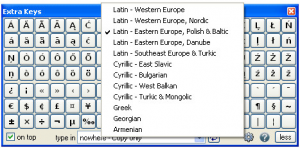A new version of Extra Keys has been released, which is a major change in one respect as it introduces selectable sets of keys. This enables a big increase in the number of character keys, in fact there are now over 600 unique characters available.
 The characters are grouped by alphabets and languages that share characters. Common accented letters are repeated on several sets, aiming at reducing the need to switch sets. For the first time, letters from some non-Latin alphabets are included. This version has Greek, Cyrillic, Georgian and Armenian as well as additional Latin accented letters that are relevant to Eastern European languages such as Polish, Hungarian and Romanian.
The characters are grouped by alphabets and languages that share characters. Common accented letters are repeated on several sets, aiming at reducing the need to switch sets. For the first time, letters from some non-Latin alphabets are included. This version has Greek, Cyrillic, Georgian and Armenian as well as additional Latin accented letters that are relevant to Eastern European languages such as Polish, Hungarian and Romanian.
The default start-up set remains as Latin for Western European languages, but with some changes. Letters for Nordic languages are moved to a separate set, while some new accented letters are added to the default set. Perhaps most notably this now includes the letters needed for Welsh. It has been pointed out that the original Extra Keys provided accented letters for most Western European languages but omitted Welsh, which is an official language within the UK. Welsh is unusual in treating W and Y as vowels that are sometimes accented. The new version has these characters. I’m ashamed to say that I’ve little knowledge of Welsh, even though my father could speak it!
The original versions concentrated on characters that were part of the ANSI code. Greatly extending the character range relies entirely on using Unicode. Most modern applications are Unicode compliant but older programs may have trouble displaying all letters.
It is also very important to use a suitable font, which can be an issue on older Windows versions. Some applications don’t give a choice of font, but many do, especially word processors and similar programs. Standard Windows fonts such as Arial and Times New Roman are actually pretty good and have most characters. If you are running on Windows XP or even Windows 2000 then you may want to install the latest font updates in order to display certain letters. There are additionally some great free fonts that have excellent Unicode support, for example the DejaVu font family that comes with OpenOffice/LibreOffice.
Due to all the additional character data the program file for this version is quite a lot bigger, though no heavy-weight at just 970Kb. The new version is still self-contained and fully portable. If you don’t need all the new letters, perhaps you only use French or Spanish, then the previous version will be fine (and smaller). It remains available for download and the actual program logic is the same as the new version, only the character range is different.
As always, for more information and downloads see the Extra Keys web page.
